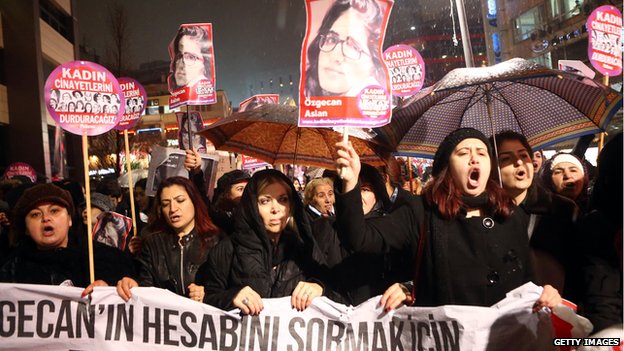|
Is life getting worse for women in Erdogan's Turkey?

BBC
The murder of 20-year-old Ozgecan Aslan, who was stabbed while reportedly resisting a rape attempt, has unleashed a storm of outrage in Turkey.
There have been mass street protests, and hundreds of thousands of women have tweeted #sendeandat - "tell your story" in Turkish - to share their experiences of abuse. Human rights groups say there has been a dramatic rise in violence against women during the rule of the current president, Recep Tayyip Erdogan.
Leader of the AKP, he was elected as prime minister in 2002 and last year became the country's first elected president. He has called violence against women "a bleeding wound of Turkey", and vowed to launch a new campaign against it. But he has also said that women are not equal to men.
So is life getting worse for women in Erdogan's Turkey? Four expert witnesses spoke to the BBC World Service's The Inquiry.
Karen Barkey grew up in Istanbul in the late 1970s and 1980s, and is now a professor of sociology and history at Columbia University in New York.
"I grew up at a time where Turkey was quite secular and where girls were really seen as equal to boys in schools. There is [now] a new conservatism - a new religious conservatism - which makes it more difficult for women, I think, in contemporary Turkey."
Professor Barkey argues that under Mr Erdogan, the AKP has mobilised that more conservative, religious population, who felt shut out by the Westernizing elites who ruled Turkey for the previous decades.
"Some people say that actually Erdogan did start as much more democratic, and in his attempt to empower a part of the population that had been very marginalised during the republican era - the conservative, small scale, middle class, lower-middle class, the more religious people in Anatolia - by giving them much more opportunities, business contracts and getting also their vote, as a result that he really opened up Turkey and made it more democratic.
"Turkey had to change in that way. But it came at a price of increased conservatism."
Mr Erdogan has been criticised for closing down freedom of speech and dissent in Turkey, and in 2013, 3.5 million people took part in protests against his government. But he remains both popular and powerful.
"I think the major, most acute tension that divides Turkish society today is
|
BBC, 04/03/2015
|
|
|
|
The Mary Initiative
A Bridge of Understanding
Operational, Safety, Security & First Aid Training for NGO's
|
|
|
|